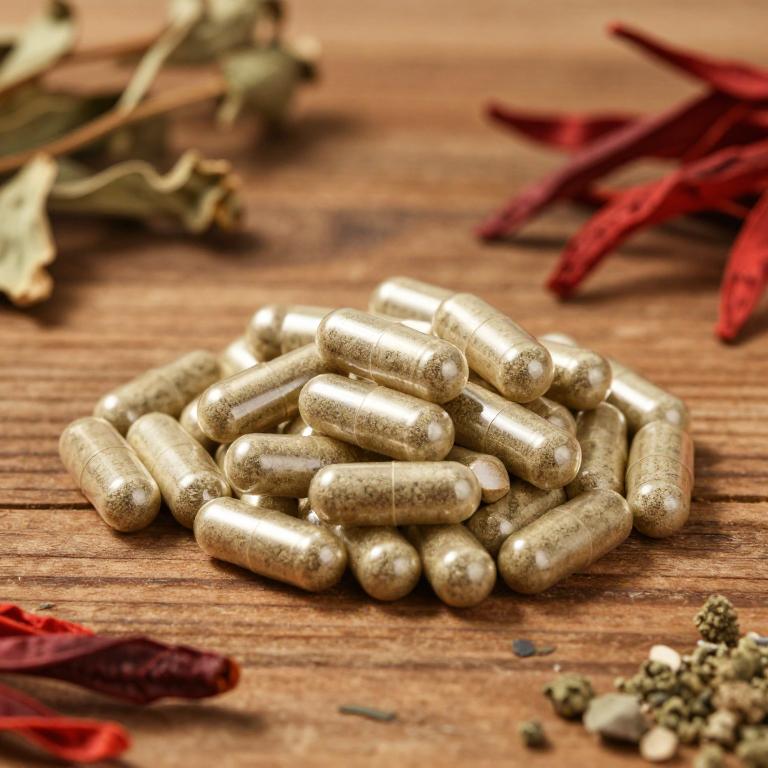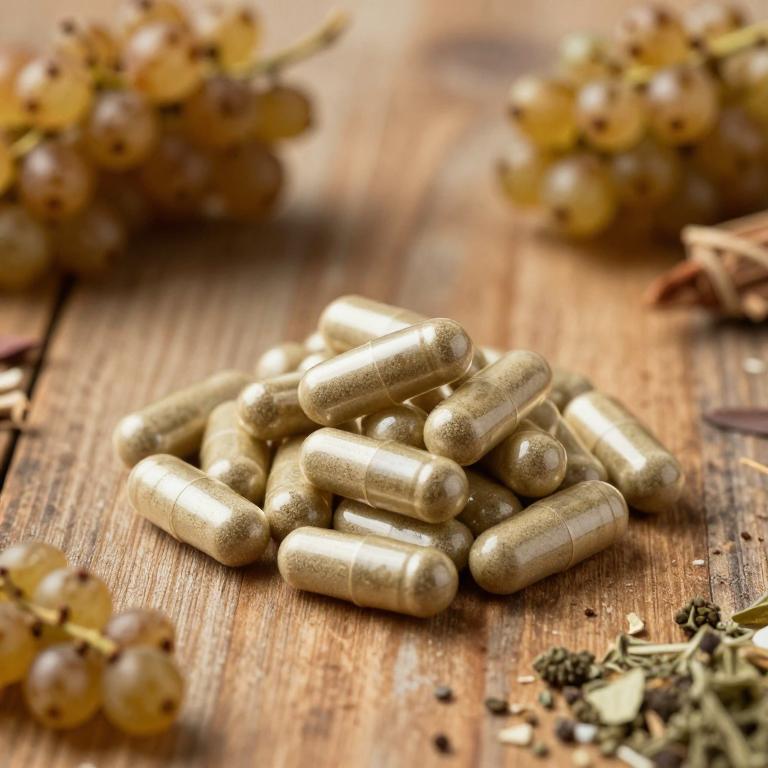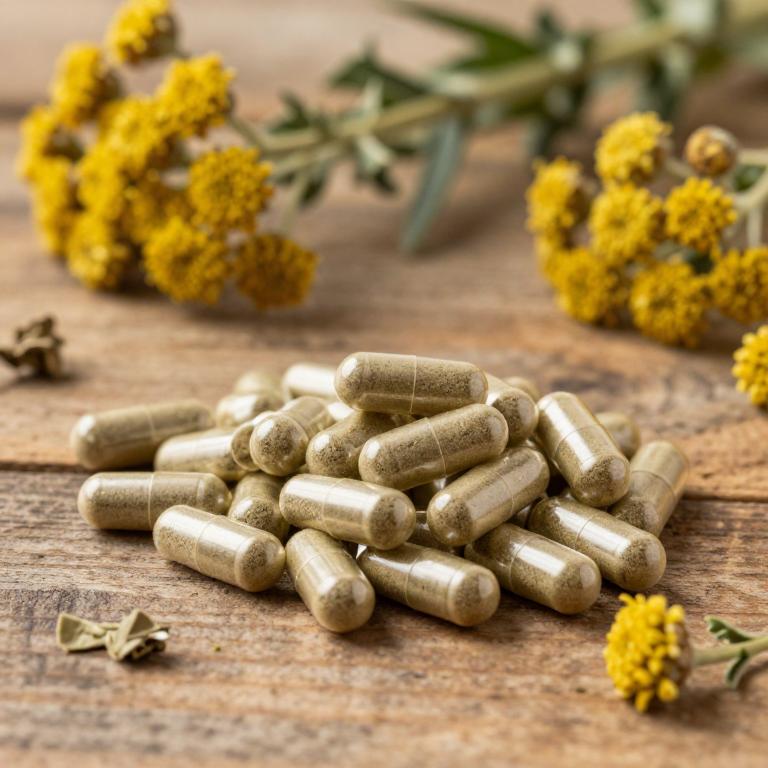10 Best Herbal Capsules For Rheumatoid Arthritis

Herbal capsules have gained popularity as a complementary therapy for managing the symptoms of rheumatoid arthritis, offering a natural alternative to conventional treatments.
These capsules often contain a blend of anti-inflammatory and immune-modulating herbs such as turmeric, ginger, boswellia, and devil’s claw, which are believed to help reduce joint pain and swelling. While some studies suggest that certain herbs may provide relief, their efficacy can vary, and they are not a substitute for prescribed medications. It is important for individuals to consult with healthcare professionals before incorporating herbal capsules into their treatment regimen to ensure safety and avoid potential interactions.
Overall, herbal capsules may offer supportive benefits but should be used cautiously as part of a holistic approach to managing rheumatoid arthritis.
Table of Contents
- 1. Turmeric (Curcuma longa)
- 2. Ginger (Zingiber officinale)
- 3. Red sage (Salvia miltiorrhiza)
- 4. Thistle (Silybum marianum)
- 5. Common grape (Vitis vinifera)
- 6. Echinacea (Echinacea purpurea)
- 7. Licorice (Glycyrrhiza glabra)
- 8. St. john's wort (Hypericum perforatum)
- 9. Chaste tree (Vitex agnus-castus)
- 10. Yarrow (Achillea millefolium)
1. Turmeric (Curcuma longa)

Curcuma longa, commonly known as turmeric, is a widely used herbal remedy that contains the active compound curcumin, which has been studied for its anti-inflammatory and antioxidant properties.
These properties make curcuma longa herbal capsules a potential complementary treatment for rheumatoid arthritis, a chronic autoimmune disorder characterized by joint inflammation and pain. Clinical studies suggest that curcumin may help reduce inflammatory markers and alleviate symptoms such as joint swelling and stiffness in patients with rheumatoid arthritis. However, the bioavailability of curcumin is low, so formulations with enhanced absorption, such as those combined with piperine, are often recommended.
While curcuma longa capsules are generally considered safe, they should be used under the guidance of a healthcare professional, especially when combined with conventional medications.
2. Ginger (Zingiber officinale)

Zingiber officinale, commonly known as ginger, has been traditionally used for its anti-inflammatory and analgesic properties, making it a popular herbal remedy for rheumatoid arthritis.
Herbal capsules containing zingiber officinale are often used as a complementary therapy to help reduce joint pain and stiffness associated with the condition. These capsules are typically standardized to ensure consistent levels of active compounds like gingerol and shogaol, which are believed to contribute to their therapeutic effects. While some studies suggest that ginger may help alleviate symptoms, it is important to consult a healthcare provider before using it, especially in conjunction with conventional treatments.
Overall, zingiber officinale herbal capsules offer a natural alternative that may support symptom management in rheumatoid arthritis patients.
3. Red sage (Salvia miltiorrhiza)

Salvia miltiorrhiza, commonly known as Danshen, is a traditional Chinese herb that has been used for centuries to support cardiovascular health and reduce inflammation.
Recent studies suggest that its active compounds, such as tanshinone and salvianolic acid, may possess anti-inflammatory and antioxidant properties that could be beneficial in managing rheumatoid arthritis. Herbal capsules containing Salvia miltiorrhiza are often used as a complementary therapy to help alleviate joint pain and stiffness associated with the condition. While some clinical trials show promising results, more research is needed to fully understand its efficacy and safety in treating rheumatoid arthritis.
As with any herbal supplement, it is important to consult a healthcare provider before incorporating Salvia miltiorrhiza into a treatment plan.
4. Thistle (Silybum marianum)

Silybum marianum, commonly known as milk thistle, is a herbal supplement often used for its potential anti-inflammatory and antioxidant properties.
When formulated into capsules, it may offer a convenient and standardized way to consume its active compounds, such as silymarin. Some studies suggest that silymarin may help reduce inflammation and oxidative stress, which are key factors in the progression of rheumatoid arthritis. However, while preliminary research is promising, more clinical trials are needed to confirm its efficacy and safety for managing this autoimmune condition.
As with any supplement, it is important to consult a healthcare provider before using silybum marianum, especially for individuals with existing health conditions or those taking other medications.
5. Common grape (Vitis vinifera)

Vitis vinifera herbal capsules, derived from the grapevine plant, are traditionally used for their potential anti-inflammatory and antioxidant properties.
These capsules may support individuals with rheumatoid arthritis by helping to reduce joint inflammation and alleviate pain. While some studies suggest that resveratrol, a compound found in Vitis vinifera, may have beneficial effects on immune function and inflammation, more research is needed to confirm its efficacy in treating rheumatoid arthritis. It is often used as a complementary therapy alongside conventional treatments, but it should not replace prescribed medications without consulting a healthcare professional.
As with any herbal supplement, it is important to consider potential interactions and side effects, especially for those with existing health conditions.
6. Echinacea (Echinacea purpurea)

Echinacea purpurea, commonly known as purple coneflower, is a popular herbal remedy that has been studied for its potential anti-inflammatory and immune-modulating properties.
While it is traditionally used to support immune function and reduce the duration of colds, some research suggests it may also have benefits for conditions like rheumatoid arthritis (RA) due to its ability to inhibit pro-inflammatory cytokines. Herbal capsules containing Echinacea purpurea are often marketed as natural supplements that may help alleviate RA symptoms such as joint pain and swelling. However, more clinical trials are needed to confirm its efficacy and safety for long-term use in RA patients.
As with any supplement, it is important to consult a healthcare provider before incorporating Echinacea into a treatment plan for rheumatoid arthritis.
7. Licorice (Glycyrrhiza glabra)

Glycyrrhiza glabra, commonly known as licorice root, has been traditionally used in herbal medicine for its anti-inflammatory and immune-modulating properties.
Recent studies suggest that glycyrrhiza glabra herbal capsules may offer potential benefits for individuals with rheumatoid arthritis by reducing joint inflammation and alleviating pain. The active compounds in licorice root, such as glycyrrhizin and flavonoids, are believed to inhibit pro-inflammatory cytokines and support the body's natural healing processes. However, long-term use of licorice root can lead to side effects like hypertension and electrolyte imbalances, so it should be used under the guidance of a healthcare professional.
As a complementary therapy, glycyrrhiza glabra capsules may help manage symptoms of rheumatoid arthritis when used alongside conventional treatments.
8. St. john's wort (Hypericum perforatum)

Hypericum perforatum, commonly known as St. John's Wort, is a herbal remedy that has been traditionally used for its potential anti-inflammatory and analgesic properties.
While it is widely recognized for its use in treating mild to moderate depression, recent studies suggest it may also have beneficial effects in managing symptoms of rheumatoid arthritis. The active compounds in hypericum perforatum, such as hyperforin and hypericin, are believed to contribute to its anti-inflammatory actions by modulating neurotransmitter levels and reducing oxidative stress. However, it is important to note that its use in rheumatoid arthritis should be approached with caution due to potential interactions with other medications, including immunosuppressants and antidepressants.
As with any herbal supplement, individuals should consult with a healthcare professional before incorporating hypericum perforatum into their treatment regimen for rheumatoid arthritis.
9. Chaste tree (Vitex agnus-castus)

Vitex agnus-castus, commonly known as chasteberry, is a herbal remedy that has been traditionally used for various health conditions, including hormonal imbalances and menstrual disorders.
While it is not a primary treatment for rheumatoid arthritis (RA), some studies suggest that its anti-inflammatory and antioxidant properties may offer supportive benefits for individuals with RA. Herbal capsules containing Vitex agnus-castus are often used as a complementary therapy to help manage symptoms such as joint pain and inflammation. However, it is important to consult with a healthcare provider before using this herb, as it may interact with certain medications or have side effects in some individuals.
Overall, Vitex agnus-castus may be considered a natural option to explore alongside conventional RA treatments, under professional guidance.
10. Yarrow (Achillea millefolium)

Achillea millefolium, commonly known as yarrow, is a traditional herbal remedy that has been used for centuries to address various inflammatory conditions, including rheumatoid arthritis.
Herbal capsules containing achillea millefolium are often formulated to provide a concentrated dose of its active compounds, such as flavonoids and essential oils, which are believed to possess anti-inflammatory and analgesic properties. These capsules may help reduce joint inflammation and pain associated with rheumatoid arthritis by modulating the body's immune response and inhibiting pro-inflammatory cytokines. While some studies suggest potential benefits, it is important to consult with a healthcare provider before using these supplements, as they may interact with other medications or have side effects in certain individuals.
Overall, achillea millefolium herbal capsules are considered a complementary therapy that may support conventional treatments for rheumatoid arthritis.